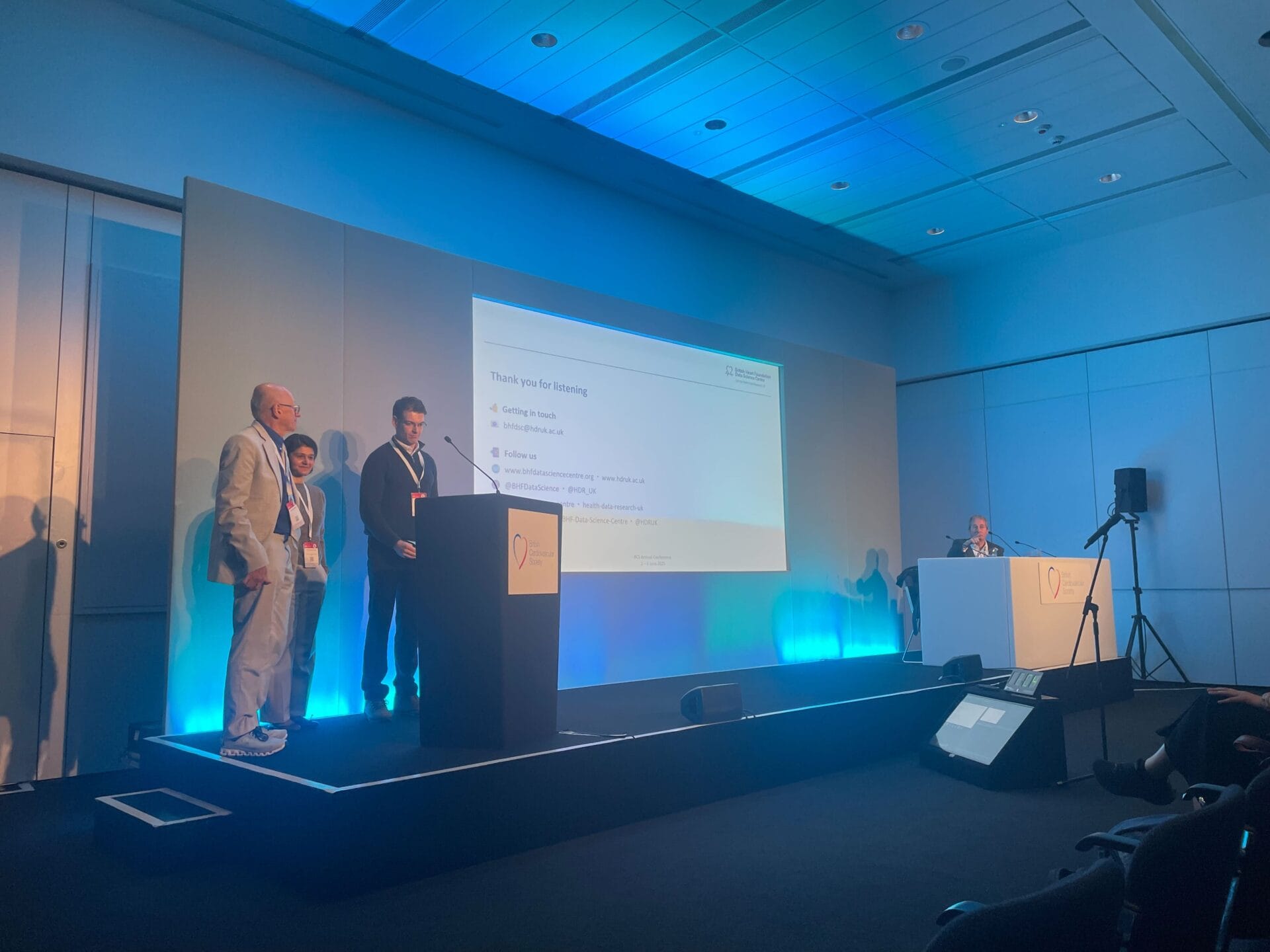On the 15th and 16th October, staff and members of our Public Advisory Group had a brilliant time at the HDR UK Conference in Glasgow.
In this blog, we hear reflections from three attendees. Public contributor Matthew Tosh talks about how the conference improved his understanding of health data research in practice and the importance of public trust. Health Data Scientist Laura Sherlock discusses trust and transparency in health data science, as well as the value of international perspectives. Dr Jackie MacArthur then shares her reflections on the importance of health data for innovation and improving lives, and the role the BHF Data Science Centre plays in this.
Matthew Tosh
Member of the BHF Data Science Centre Public Advisory Group
Attending this year’s conference has helped fill some gaps in my understanding of how health data research operates in practice. I had a guided tour of the HDR UK Gateway, to see how researchers use the interface to identify relevant datasets. It was mind-blowing to glimpse the scale and complexity of what exists – and a reminder of why public involvement and trust are so essential.
Conversations with data scientists and researchers from across the country were especially valuable. Several told me how refreshing it was to talk directly with a patient, as they don’t often get that opportunity face-to-face. Those exchanges seemed to bring home the real-world impact of their work – the human stories behind the data.
Unsurprisingly, artificial intelligence was a dominant theme throughout the conference. The pace of progress feels almost dizzying, and the potential to transform diagnostics and prediction is enormous. Yet the discussions also highlighted how difficult it is for regulation and risk assessment to keep pace with innovation. Finding that balance between opportunity and oversight will be crucial for earning and maintaining public trust.
One particular line that stayed with me came from Cathie Sudlow, responding to one of the presentations:
“How can we move the public discourse from the risks of using health data – to the risks of not using it?”
That question captures the spirit of the whole event for me: A commitment to trust, transparency and impact – and a recognition that involving patients and the public is not just good practice, but essential to making data research truly meaningful.
Laura Sherlock
Early Career Health Data Scientist, BHF Data Science Centre
Attending the HDR UK Scientific Conference in Glasgow was a welcome opportunity to connect with colleagues and collaborators, and hear about the latest advances shaping health data research across the UK and beyond.
One thing that stood out compared with other conferences I’ve attended was how often trust and transparency came up in discussions. It was encouraging to see how strongly patient and public involvement (PPIE) featured throughout the conference, with emphasis on embedding PPIE in projects from the very beginning, rather than treating it as an add-on. I was pleasantly surprised by how many sessions highlighted co-production and the value of listening to public voices.
As a data scientist, I was particularly inspired by sessions showing how data are being used to make tangible improvements to healthcare. The Data-Driven Solutions to NHS Pressures session showcased how data can directly support smarter, more efficient healthcare, with the discussion which followed also reminding us of the importance of careful communication when translating findings into public messages.
Professor Angela Wood’s keynote on Insights from Whole-Population Electronic Health Records in England, Northern Ireland, Scotland and Wales was another highlight. It was great to see the progress toward uniting datasets across the UK and motivating to hear how studies using linked records have led to high-impact studies with real-world benefits.
The international perspectives provided further valuable insights. Dr John Halamka gave a memorable talk on how innovations at the Mayo Clinic are improving health care in the U.S., while Gerrit Meijer shared a fascinating look at the evolving European health data landscape. Together, they highlighted some of the challenges in health data research which extend beyond national borders.
Overall, the conference highlighted not only the scale of innovation happening across health data research, but also the shared commitment to doing it responsibly, transparently, and in partnership with the public.
Dr Jackie MacArthur
Senior Scientific Programme Manager, BHF Data Science Centre
Earlier this month, colleagues from the BHF Data Science Centre and I were delighted to attend the HDR UK Scientific Conference in Glasgow — a fantastic opportunity to showcase our work, reconnect with collaborators, and hear thought-provoking talks from across the UK’s health data community.
A clear message ran throughout the conference: the power of health data to drive innovation and improve lives. In her keynote, Professor Angela Wood celebrated the success of population-wide health data research and highlighted the importance of working together to build trustworthy, efficient routes to data access — ensuring progress continues well beyond COVID-19.
Artificial intelligence (AI) was a major theme this year, with applications spanning the entire health data landscape. Dr John Halamka, from the Mayo Clinic, gave an inspiring talk on how AI, curated patient data, connected technologies, and strong partnerships are already transforming care delivery. Dr Jonathan Batty then showcased how natural language processing has been used to develop IMPACT — a phenotyping algorithm for identifying long-term conditions in UK electronic health records. The use of AI to support the development of phenotype definitions represents an exciting opportunity for our Defining Disease area of work, which we look forward to exploring further.
Looking ahead, Ming Tang outlined plans for the Health Data Research Service, designed to create a federated ecosystem with a single entry point and a unified end-to-end patient record — “making research central to the way we deliver the NHS.” Dr Richard Torbett from the Association of the British Pharmaceutical Industry also stressed the importance of supporting rapid, data-driven clinical trials to sustain UK research investment. Understanding user needs and embedding patient input will be key to the Service’s success.
Amid all the innovation, one theme remained central: improving people’s lives. It was heartening to have patient and public representatives with us throughout the event — a powerful reminder of why we do this work.


